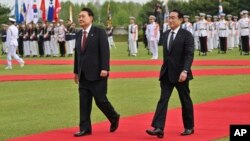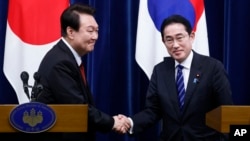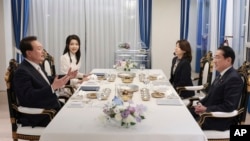China’s bid for dominance in East Asia appears to have achieved what years of U.S. efforts could not – prompt a reconciliation between feuding American allies Japan and South Korea.
The leaders of South Korea and Japan came together officially this week for the second time this year, emphasizing that security situations in the region compelled them to work together.
"Grave international circumstances" and a "complex set of global crises" necessitate cooperation between South Korea and Japan, said South Korean President Yoon Suk Yeol without naming specific countries at his second bilateral summit with Japanese Prime Minister Fumio Kishida on May 7-8.
After 12 years of strained relations stemming from Japan's 1910-45 colonial occupation of Korea, the two countries opted to mend fences when Yoon visited Tokyo in March.
While North Korea and its missile threats were their most immediate focus, "there is no doubt that China and [its] regional assertiveness weighed heavily on the minds of both countries," said Evans Revere, who served as acting assistant secretary for East Asia and Pacific affairs during the George W. Bush administration.
South Korea-Japan reconciliation offers a chance for them "to work together, and in conjunction with the United States, to make clear to Beijing that they will not accept [its] attempt to achieve regional dominance," he said.
China has increasingly become aggressive in the region, with South Korea, Japan and Taiwan all claiming that Beijing has been intruding into their territorial waters and airspaces.
At a meeting in January, the U.S. and Japan expressed concern about China's attempts "to reshape the international order to its benefit and employ China's growing political and economic, military and technological power to that end."
The two nations also said they opposed "China's intensified attempts to unilaterally change the status quo by force in the East China Sea."
Trilateral ties
The restoration of ties between Washington's staunchest allies in Asia also provides opportunities for the Biden administration to form a united front against China, which seeks to undermine the international rules-based order in its quest to dominate the region vis-a-vis the U.S., according to experts.
"The Biden administration [has been] pushing very hard for both to restore normal functioning of their relationship to make it easier to facilitate trilateral security cooperation” on such issues as making supply chains more resilient and slowing the transfer of advanced electronics technology to China, said Daniel Sneider, a lecturer in East Asian studies at Stanford University.
"The more that the three countries can cooperate together on everything from missile defense to maritime security, the easier it is for the U.S. to be able to fulfill its broader" security goal, he said.
Soo Kim, a former CIA analyst and currently Policy Practice Area lead at LMI Consulting, said via email, "The outcome of the Yoon-Kishida summit puts the three countries one step closer towards the direction of strengthening their efforts to counter Chinese aggression in the region."
Though the leaders of South Korea and Japan did not mention China by name, the areas in which they agreed to cooperate align with U.S. goals in the region.
The Biden administration has been trying to limit the flow of advanced technologies like semiconductors into China to prevent Beijing from using the components in military applications.
Andrew Yeo, the SK-Korea Foundation chair in Korea studies at Brookings Institution's Center for East Asia Policy Studies, said, "The two sides' decision to strengthen security and economic cooperation are in part a response to greater Chinese assertiveness in the Indo-Pacific region, and not just North Korean threats."
Military and economy
As Kishida said at the post-summit joint news conference on Sunday, Seoul and Tokyo have been discussing how to link their radar with that of the U.S. so all can share data on North Korea's missile activities in live time.
Derek Grossman, a senior defense analyst focusing on security issues in the Indo-Pacific region at RAND Corporation, said in a telephone interview, "They're all going to talk about how it's related to North Korea, but we know that under the surface, what you can do against North Korea, you can also try to do against China.
"So when Japan and South Korea say, 'We're going to share information on missile defense,' China immediately thinks, 'That must be about us, too.' "
Chinese Foreign Ministry spokesperson Wang Wenbin said Tuesday at a press briefing that the allies' efforts to integrate their radar systems to track North Korea's missiles "hurt the strategic security interests of other countries" and criticized the trilateral military cooperation of Washington, Seoul and Tokyo.
At the meeting of the Group of Seven countries next week in Hiroshima, the leaders of the U.S., Japan, the U.K., Canada, France, Germany and Italy are expected to discuss China's economic practices. Yoon has been invited to attend.






